Poll: In Run-Up To District Attorney Primaries, Pennsylvania Voters Support Criminal Justice Reforms
On key issues in district attorney races, Pennsylvania voters support policies that reduce incarceration and promote rehabilitation.
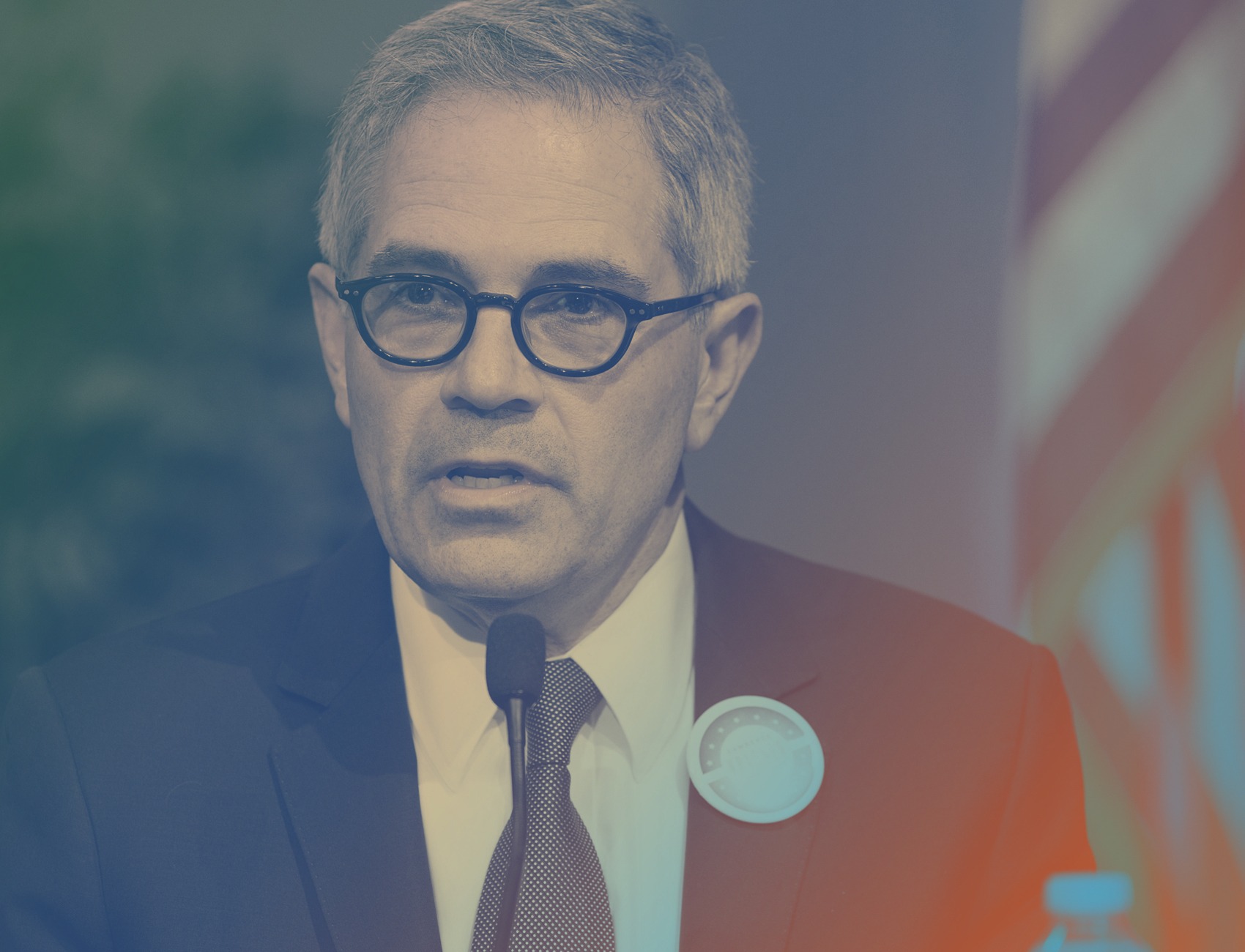
When Pennsylvania voters cast ballots for local prosecutors next week in statewide primaries, they’ll be voting for what kind of legal systems they want for their communities.
Prosecutors have unparalleled power to shape local criminal legal systems. With the “tough-on-crime” approach that prevailed for much of the 1990s and 2000s, prosecutors drove record-setting incarceration rates that filled America’s prisons and exacerbated racial inequality. But more recently, voters have elected a wave of progressive prosecutors, including Philadelphia District Attorney Larry Krasner, on policy platforms designed to minimize punishment and surveillance while instead addressing root problems that are often criminalized, such as poverty and mental illness. In cities and counties across the country, more prosecutors are taking a holistic, decarceral approach to public safety, working to connect people, including crime victims, with the resources they need to thrive instead of compounding harm with jails and prisons.
On May 18, Pennsylvania voters in 17 counties will vote for district attorneys in the statewide primaries. Primaries are closed-party, so voters cast ballots for their party’s favored candidates to run in November’s general election. In one-sided places, like the heavily Democratic Philadelphia, this means that primaries often determine November outcomes.
Nationally, eyes are on Philadelphia, where Krasner, perhaps the most prominent leader of the progressive prosecutor movement, has reduced the use of cash bail, limited probation terms, reduced future years of incarceration, and reduced drug possession charges. But a new poll from Data for Progress and The Lab shows that Pennsylvanians support these issues not just in Philadelphia, but across the state.
We surveyed Pennsylvania voters on key issues central to district attorney races, including bail, probation, sentencing, and drug policies. The results reveal compelling support for policies that reduce incarceration and promote rehabilitation.
Pennsylvania voters want rehabilitation to matter in sentencing:
Pennsylvania has the second-highest number of people serving life sentences and is one of only six states that does not allow for the possibility of parole for people serving life sentences. But voters overwhelmingly support reducing sentences based on personal improvement. When asked about their views on how individuals should serve sentences, 75 percent of voters agreed that individuals who demonstrate good behavior and personal improvement should be eligible for sentence reductions, compared to only 19 percent who agreed that individuals should serve their full sentences with no change for reductions based on good behavior.
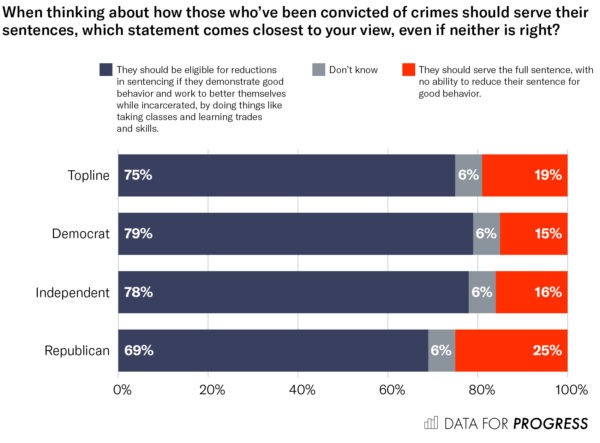
Pennsylvania voters want less probation:
Pennsylvania has the sixth-highest rate of probation in the country, and sentences are limited only by the maximum punishment allowable for a crime. This means individuals can be put under supervision for decades. Pennsylvania voters want to see changes to the state’s overreliance on probation, a policy shift prosecutors can greatly influence with the charges they bring and probation terms they seek. When provided with information on Pennsylvania’s long probation sentences and high rate of supervision:
- 68 percent of voters, including 73 percent of Democrats, 75 percent of independents, and 58 percent of Republicans, support terminating probation when supervision is no longer needed.
- 53 percent of voters support a three year maximum on probation sentences.
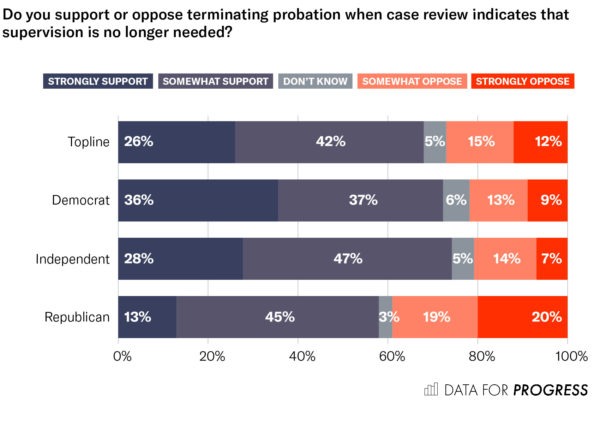
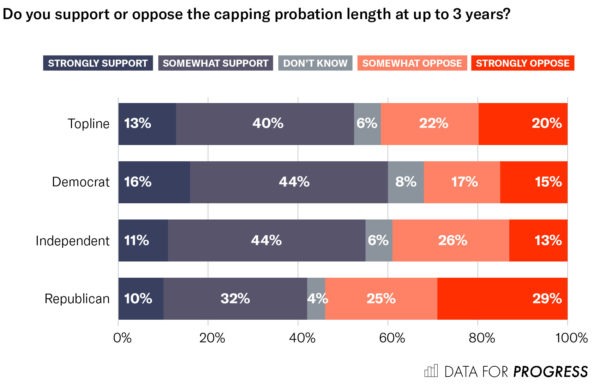
Pennsylvania voters want to limit cash bail:
When cash bail is set so high that an individual can’t afford to pay, it leads to pretrial detention. In many cases, detention follows from even relatively low bail amounts, creating a system that cages people simply for lacking money. Being jailed pretrial has significant collateral consequences, from an increased likelihood of conviction and recidivism to loss of employment and family. Provided with the information that reducing reliance on cash bail in Philadelphia did not lead to failures to appear in court or arrests while awaiting trial, Pennsylvania supported limiting the use of cash bail. Sixty-four percent of voters, including 69 percent of Democrats, 63 percent of independents, and 58 percent of Republicans, support limiting the use of cash bail.
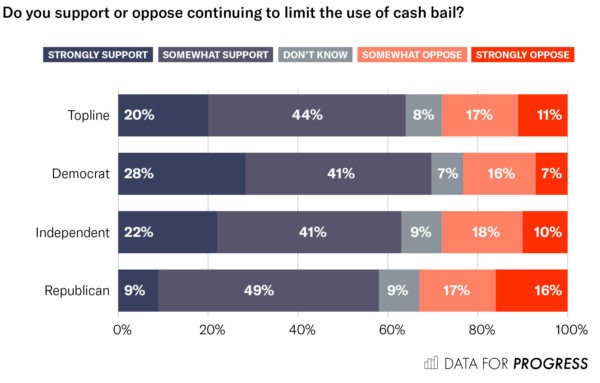
Pennsylvania voters want to eliminate drug possession penalties:
In 2019, almost 21,800 people in Pennsylvania were arrested and charged for possessing just over an ounce of cannabis. According to an ACLU report published in April 2020, Black people are 3.64 times more likely than white people to be arrested for marijuana possession. As cities across the state pass ordinances decriminalizing marijuana possession and with Krasner dropping drug charges when individuals show they are in treatment, voters show they are ready for new drug possession policies. 60 percent of voters support their district attorney eliminating criminal penalties for simple drug possession altogether.
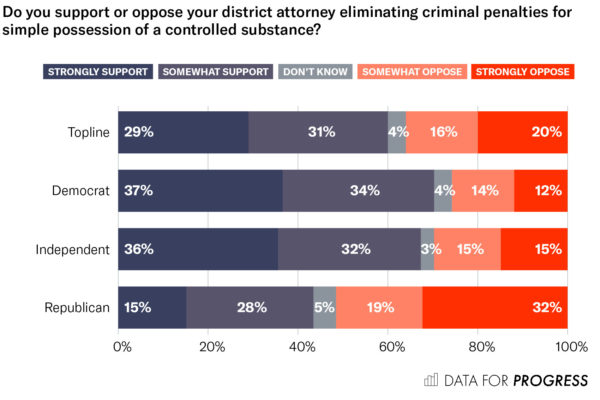
Polling Methodology
From April 30 to May 5, 2021, Data for Progress conducted a survey of 632 likely voters in Pennsylvania using web panel respondents. The sample was weighted to be representative of likely voters by age, gender, education, race, and voting history. The survey was conducted in English. The margin of error is ±4 percentage points.

